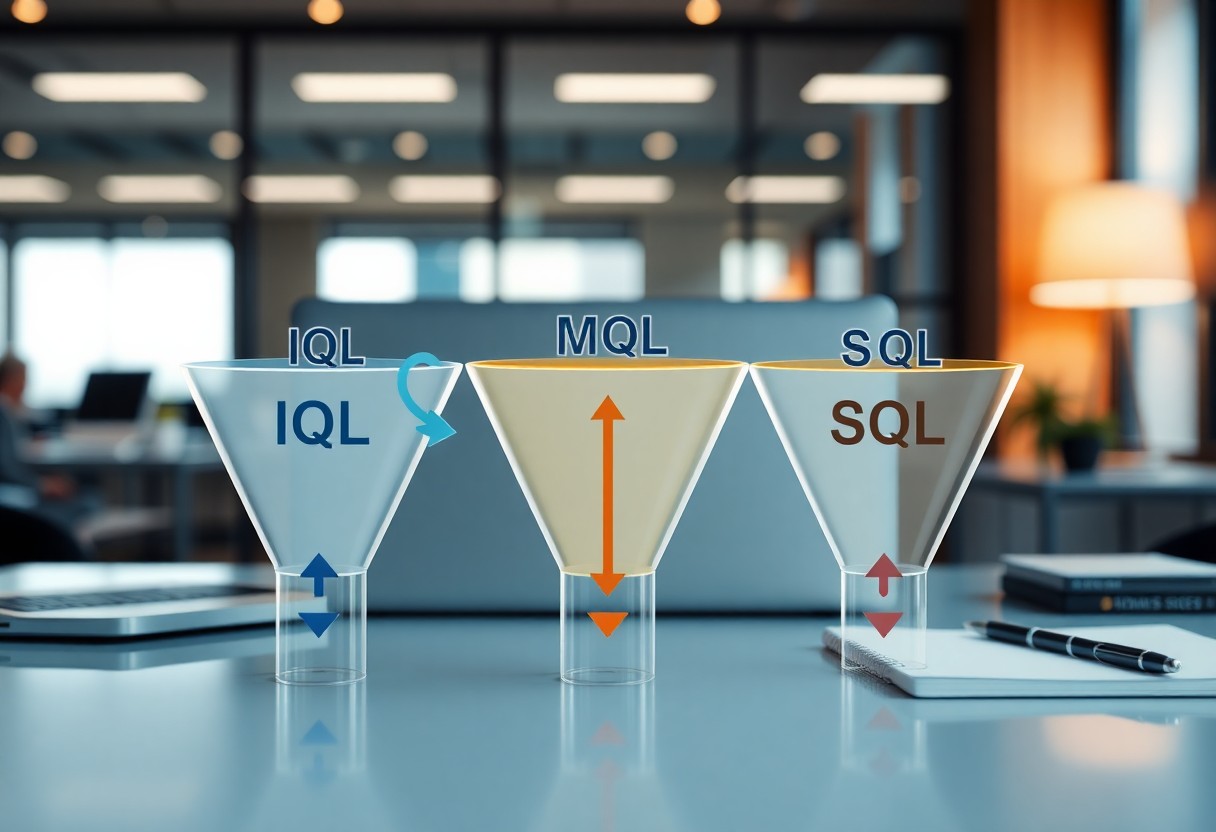There’s a distinct hierarchy in lead qualification that can significantly impact your sales strategy and success. Understanding the differences between Information Qualified Leads (IQL), Marketing Qualified Leads (MQL), and Sales Qualified Leads (SQL) enables you to tailor your approach, increase conversion rates, and optimize your lead management process. By grasping where each type of lead fits in your sales funnel, you can make informed decisions that drive growth and enhance your overall marketing effectiveness.
Key Takeaways:
- Definition Variations: IQL, MQL, and SQL represent different stages in the lead qualification process, with IQL focusing on basic interest, MQL indicating engagement by potential customers, and SQL showing readiness for sales discussions.
- Qualification Criteria: Each lead type is qualified based on specific criteria; IQLs are assessed for initial information interest, MQLs for marketing interaction levels, and SQLs based on their intent to purchase and alignment with sales objectives.
- Conversion Pathways: Understanding the distinctions between these lead types enhances strategies for converting MQLs to SQLs, ensuring a smoother transition and optimizing the sales funnel for improved efficiency.
Understanding Lead Management
Before plunging into the specifics of lead qualification, it’s important to understand lead management as a comprehensive process. Lead management encompasses the strategies and practices that help you track, nurture, and convert potential customers at various stages of the sales funnel, ultimately ensuring that your marketing efforts translate into measurable results.
What is Lead Management?
Beside its definition, lead management plays a pivotal role in your sales strategy. It involves systematically capturing leads, qualifying them based on interest and potential, and guiding them through the buying process until they ultimately convert into customers.
Importance of Effective Lead Management
Lead management is vital for maximizing your marketing investment and driving sales growth. By effectively managing leads, you can ensure that each potential customer receives the right level of engagement, leading to higher conversion rates and ultimately fostering a more fruitful sales pipeline.
In addition to enhancing conversion rates, effective lead management allows you to streamline your marketing efforts and improve customer relations. By understanding which leads are engaging with your content and at what stage they are in the purchasing process, you can tailor your communication strategies to better meet their needs and increase their likelihood of conversion.
Common Challenges in Lead Management
Along with its benefits, lead management often presents various challenges that can hinder your success. These challenges may include poor lead quality, inadequate tracking systems, and ineffective communication between sales and marketing teams.
Importance of addressing these challenges cannot be overstated. By identifying gaps in your lead management process and implementing effective strategies, you can overcome barriers that prevent successful conversions, ultimately leading to more streamlined operations and better alignment between your marketing and sales efforts.
Overview of Lead Qualification
Some of the most successful marketing strategies rely on effective lead qualification processes. By understanding the distinctions between Information Qualified Leads (IQL), Marketing Qualified Leads (MQL), and Sales Qualified Leads (SQL), you can streamline your approach and convert more leads into sales. Learn more about IQL, MQL Vs SQL: What does it all mean? to enhance your lead management strategy.
What is Lead Qualification?
Lead qualification is the process of assessing potential customers to determine their likelihood of making a purchase. This involves categorizing leads as IQLs, MQLs, or SQLs based on specific criteria such as engagement levels, demographic information, and purchase intent. By qualifying leads, you can focus your resources on the most promising opportunities.
The Importance of Lead Qualification
Above all, effective lead qualification ensures that your sales team spends time on leads that are most likely to convert, saving both time and resources. This process not only improves conversion rates but also enhances the overall efficiency of your marketing efforts.
In fact, businesses that prioritize lead qualification often see a significant increase in their sales performance. According to various industry studies, qualified leads tend to result in a higher return on investment, as they reflect a more targeted approach to your marketing efforts. By understanding the lead qualification process, you can align your sales and marketing teams for optimal results.
Lead Qualification Metrics
Lead qualification metrics are key performance indicators used to evaluate the quality of leads in your pipeline. These metrics help you assess how effectively your marketing efforts are generating viable leads that align with your company’s goals.
The focus on lead qualification metrics allows you to measure key factors such as lead scoring, conversion rates, and engagement levels. By closely monitoring these metrics, you can refine your strategies, improve your lead quality, and ultimately increase your sales effectiveness.
It’s vital for you to grasp the distinctions between Information Qualified Leads (IQL), Marketing Qualified Leads (MQL), and Sales Qualified Leads (SQL) in order to enhance your lead management strategy. Understanding these classifications will enable you to streamline your marketing efforts, improve lead conversion rates, and ultimately drive sales success. In this blog post, we’ll explore each type of lead, clarifying their unique characteristics and how you can effectively manage them to boost your business outcomes.
Information Qualified Lead (IQL)
Your understanding of Information Qualified Leads (IQLs) is necessary for effective lead management, as they serve as the first layer in the lead qualification process. IQLs represent potential leads that have engaged with your content, showing interest but not yet demonstrated intent to make a purchase.
Definition of IQL
Against the backdrop of lead management, an Information Qualified Lead (IQL) is a contact who has displayed basic engagement with your marketing efforts, often by downloading a piece of content or signing up for a newsletter. This initial interaction signifies a level of curiosity about your offerings.
Characteristics of IQL
Before diving deeper, you should note that IQLs possess characteristics such as minimal but meaningful engagement, no direct purchasing intent, and a willingness to explore relevant information from your resources.
But, understanding these characteristics is crucial. IQLs typically come from various channels, including social media, blogs, and webinars. They have opened a window into your content and yet require nurturing to gauge their interest levels further. This stage often signifies a generalized curiosity rather than a specific need or urgency to buy.
How IQL Fits into the Lead Management Process
Between generating IQLs and advancing them through the sales funnel lies the importance of nurturing strategies. These leads need to be educated further, leading them closer to your products or services.
The nurturing process in lead management incorporates targeted content that aligns with their interests, gradually transforming them from IQLs to Marketing Qualified Leads (MQLs). By maintaining communication and providing valuable insights, you effectively guide IQLs toward more engaged interactions that signal a stronger consideration for your offerings.
Marketing Qualified Lead (MQL)
Not every lead is created equal; understanding the distinction between different types of leads is necessary for your marketing strategy. A Marketing Qualified Lead (MQL) indicates a prospective customer who has interacted with your marketing efforts and showed interest in your products or services. MQLs are typically further down the sales funnel, suggesting they are more likely to convert into paying customers compared to unqualified leads.
Definition of MQL
Across various marketing frameworks, a Marketing Qualified Lead (MQL) is defined as a lead that has been deemed more likely to become a customer based on specific criteria. This qualification often arises from lead scoring systems that evaluate actions such as website visits, downloading resources, and engagement with your brand through emails and social media.
Characteristics of MQL
The primary characteristics of MQLs include demonstrated interest in your offerings and readiness to engage with your sales team. These leads often exhibit behaviors such as downloading whitepapers, attending webinars, or regularly interacting with your content, signaling a higher level of engagement and potential for conversion.
Characteristics of MQLs include demographic fit, behavioral signals, and engagement levels. Your MQLs typically align with your target audience profile, showcasing behaviors like subscribing to newsletters, filling out forms, or engaging in specific marketing campaigns. By identifying these attributes, you can prioritize leads effectively, ensuring that your sales team focuses on prospects with the highest potential to convert.
The Role of MQL in Marketing Strategy
For successful marketing strategies, MQLs play an integral role in bridging the gap between marketing and sales. They serve as a filter, allowing your marketing teams to allocate resources efficiently by prioritizing leads that are more likely to convert into customers.
And, by nurturing these MQLs through targeted campaigns, you can enhance their readiness for sales engagement. This alignment not only improves conversion rates but also fosters stronger collaboration between your marketing and sales departments, ensuring a more streamlined approach to lead management. Leveraging MQLs effectively can lead to a more optimized sales pipeline and increased revenue opportunities for your business.
Sales Qualified Lead (SQL)
Now that you understand MQLs, it’s necessary to examine what constitutes a Sales Qualified Lead (SQL). SQLs are prospects who have been vetted and deemed ready for direct engagement by sales teams, having shown intent to purchase and fit right into your ideal customer profile.
Definition of SQL
An SQL is a lead that has been evaluated based on specific criteria, indicating a higher likelihood of conversion compared to other leads. These criteria often include, but aren’t limited to, the prospect’s purchasing authority, timeline, and budget.
Characteristics of SQL
For a lead to be classified as an SQL, certain characteristics must be met. This includes a demonstrated interest, active engagement with your content, and alignment with your target market’s demographics.
A solid SQL typically exhibits a strong desire to engage further, such as requesting demos, asking for proposals, or directly speaking with your sales team. They understand their needs and are actively seeking solutions—this positions them as one of the warmest leads in your pipeline.
The Role of SQL in the Sales Process
To maximize your sales efforts, SQLs play a pivotal role in the sales process by focusing your team’s resources on leads that are more likely to convert. Recognizing these leads helps prioritize your outreach efforts effectively.
Due to their demonstrated interest and higher qualification level, SQLs are more receptive to tailored pitches, making your sales presentations more impactful. By concentrating on SQLs, you increase your chances of closing deals and reducing the sales cycle, ultimately driving revenue growth for your organization.
Comparing IQL, MQL, and SQL
Despite the variations in lead types, understanding the distinctions between Information Qualified Leads (IQL), Marketing Qualified Leads (MQL), and Sales Qualified Leads (SQL) is crucial for optimizing your lead management efforts. Each type plays a unique role in the sales funnel, enabling your marketing and sales teams to focus on leads that offer the highest potential for conversion.
Lead Type Comparison
| Lead Type | Description |
|---|---|
| IQL | Leads that have shown basic interest but require more information. |
| MQL | Leads that have engaged with marketing efforts and are considered more likely to be interested in your product. |
| SQL | Leads that are ready to be approached by the sales team for a potential conversion. |
Key Differences Among IQL, MQL, and SQL
About distinguishing between IQL, MQL, and SQL helps you gauge where your leads stand in their purchasing journey. IQLs require nurturing, MQLs are prepped for sales engagement, and SQLs are primed for direct sales contact, thus enabling you to develop effective marketing strategies tailored to each group.
The Lead Qualification Journey
Along your lead qualification journey, you’ll identify where each lead stands based on their engagement and readiness to convert. Understanding this path ensures your resources are allocated efficiently, thus enhancing your team’s effectiveness in targeting the right leads at the right time.
Due to varying lead behaviors, implementing a structured approach to qualification is beneficial. You’ll routinely assess and categorize leads, ensuring that your sales and marketing teams are synchronized and focused on the most promising opportunities. This streamlined process can significantly boost conversions and save time.
Importance of Distinguishing Between Lead Types
Types of leads significantly influence your marketing strategy, ensuring tailored approaches align with their needs:
- Guides resource allocation effectively.
- Improves conversion rates by targeting the right audience.
- Enhances collaboration between marketing and sales teams.
- Increases lead engagement with personalized communication.
- Perceiving leads differently helps refine your sales approach.
A clear distinction between lead types allows your team to adopt tailored strategies, fostering better engagement and higher conversion rates. By understanding IQL, MQL, and SQL, you’re equipped to create targeted campaigns that resonate with potential customers:
- Facilitates efficient use of resources.
- Encourages priority management for high-potential leads.
- Supports better measurement of marketing effectiveness.
- Aids in understanding customer needs and behavior.
- Perceiving the nuances in lead types can dramatically impact your sales success.
Managing MQL vs SQL
After generating a substantial number of leads, it’s imperative to effectively manage both MQLs and SQLs to optimize your sales funnel. Understanding their differences allows you to tailor your approach, ensuring that your marketing efforts convert into actual sales. By implementing a structured management strategy, you can maximize engagement and increase conversion rates, ultimately driving business growth.
Strategies for Managing MQL
Across your marketing initiatives, focusing on nurturing MQLs through targeted content and personalized communication is vital. You should implement automated follow-ups and segment your leads based on behavior data. This strategic nurturing not only keeps leads engaged but also prepares them for the potential transition to SQL, enhancing your chances of success.
Strategies for Managing SQL
On the other hand, managing SQLs requires a more direct approach to sales. You should prioritize timely responses and utilize sales enablement tools to equip your team with relevant information about each lead. Understand that SQLs are often closer to making a purchasing decision, so you’ll want to approach them with clear and compelling value propositions.
Indeed, personalizing your communication with SQLs can significantly improve conversion rates. Tailor your conversations based on the lead’s specific needs and pain points discovered during the MQL phase. By demonstrating a deep understanding of their requirements and how your solution addresses them, you position your offering as the best choice, facilitating a smoother transition to closing the deal.
Integration of MQL and SQL Management
An effective integration of MQL and SQL management strategies is imperative for maintaining a seamless sales process. You should analyze the data from your MQL interactions to refine how you approach SQLs. This approach ensures you are leveraging insights from initial engagements to enhance conversion strategies, making the handoff between marketing and sales more efficient.
Hence, creating a collaborative system where marketing and sales teams share insights and data can elevate your overall lead management process. By fostering open communication and utilizing a unified platform, you streamline efforts, ensuring no lead falls through the cracks, and maximizing your chances of closing deals successfully.
Tools and Technologies for Lead Management
Keep your lead management process streamlined and efficient by utilizing the right tools and technologies. These solutions allow you to engage, track, and nurture your leads at every stage of their journey, from Information Qualified Leads (IQL) to Sales Qualified Leads (SQL), ensuring higher conversion rates and enhanced productivity within your marketing and sales teams.
CRM Systems and Their Role
Around 65% of businesses that use CRM systems see an increase in sales productivity. CRM systems play a vital role in lead management by centralizing your lead data, facilitating better communication among your teams, and offering insights into customer interactions. By harnessing the power of a quality CRM, you can efficiently convert MQLs into SQLs while maximizing the potential of your leads.
Marketing Automation Tools
Technologies such as marketing automation tools are necessary for nurturing leads through personalized communication and targeted campaigns. By automating repetitive tasks, you free up valuable time and resources, allowing your team to focus on building relationships with potential customers. This enables a seamless transition from MQL to SQL and enhances your overall lead management strategy.
It streamlines your marketing efforts by delivering tailored content based on lead behavior, thereby increasing engagement rates. Tools like HubSpot or Marketo can assist in segmenting leads, scoring them based on interest, and triggering automated follow-ups. Your ability to respond promptly and appropriately can significantly enhance your chances of converting MQLs into SQLs.
Analytics for Lead Tracking and Conversion
With the right analytics tools, you gain a deeper understanding of lead behavior and conversion metrics. By tracking interactions across various channels, you can assess the effectiveness of your marketing strategies and identify which approaches yield the best results. This data-driven insight enables you to optimize your efforts and improve your lead management process.
Systems equipped with robust analytics capabilities can provide you with actionable insights regarding customer behavior, helping you refine your messaging and outreach efforts. By analyzing metrics such as lead source performance and conversion rates, you can make informed decisions to enhance your overall effectiveness in moving leads through the funnel. This is crucial for maintaining a competitive edge in today’s dynamic marketplace.
Best Practices for Converting MQL to SQL
For effective lead management, it’s vital to implement best practices for converting Marketing Qualified Leads (MQLs) to Sales Qualified Leads (SQLs). Focus on understanding the needs and behaviors of your leads to create customized engagement strategies. Analyzing lead data can help you identify patterns that signal readiness for a sales conversation, ensuring a smoother transition from marketing to sales efforts.
Identifying Conversion Triggers
On your journey to converting MQLs to SQLs, identifying conversion triggers is key. These triggers can include specific actions like downloading a resource, attending a webinar, or engaging with your content on social media. By monitoring these behaviors, you can gain insights into when a lead is highly interested and ready for direct outreach.
Aligning Marketing and Sales Teams
Triggers for successful conversion rely heavily on aligning your marketing and sales teams. This alignment ensures that both teams understand the criteria that define an SQL and facilitates a smoother handoff of leads. Continuing collaboration between your teams helps create a cohesive strategy that optimizes the path from MQL to SQL.
Best practices for alignment include regular meetings to review lead quality, sharing key performance metrics, and developing a unified definition of what constitutes an SQL. This shared vision promotes synergy, allowing your marketing and sales teams to work together effectively towards common goals.
Ongoing Communication and Nurturing
With continuous communication and nurturing efforts, you can help elevate your MQLs to SQLs. Regular check-ins and follow-ups allow you to address any questions or concerns leads may have, reinforcing their interest in your offerings and keeping them engaged throughout the sales funnel.
Another effective strategy is to provide personalized content and insights based on their past interactions. Tailored emails, newsletters, and targeted marketing campaigns can nurture your leads, ensuring they receive value and stay connected to your brand. This ongoing engagement plays a pivotal role in ensuring leads remain warm and open to transitioning into a sales conversation.
Measuring Success in Lead Management
All successful lead management strategies rely on effective measurement to assess performance. By evaluating your lead quality and conversion rates, you can ensure your marketing efforts are driving meaningful results. For more insights, check out What Type of B2B Leads Do You Have: IQLs, MQLs, or SQLs? Understanding these distinctions is key to refining your approach and optimizing your campaigns.
Key Performance Indicators (KPIs)
The foundation of measuring success in lead management lies in defining clear Key Performance Indicators (KPIs). These metrics, such as lead conversion rates, average deal size, and customer acquisition cost, help you assess the efficiency of your lead generation and nurturing processes.
Analyzing Lead Conversion Rates
Behind every successful sales strategy is a thorough understanding of lead conversion rates. Analyzing how leads progress from IQL to MQL and finally to SQL provides you with valuable insights into the effectiveness of your marketing and sales alignment.
And tracking these conversion rates over time reveals patterns and trends, allowing you to identify which lead sources yield the highest quality prospects. By focusing on improving these rates, you can enhance your overall lead management strategy.
Continuous Improvement Strategies
Beside analyzing current performance, implementing continuous improvement strategies is crucial for long-term success. Regularly reviewing your lead management processes and innovating based on data-driven insights ensures you stay ahead in a competitive landscape.
Improvement initiatives could include refining your content marketing efforts, enhancing your lead qualification criteria, or incorporating feedback loops to better understand customer needs. This ongoing commitment to evolution is vital for maintaining effective lead management and maximizing return on investment.
Common Mistakes to Avoid in Lead Qualification
Once again, understanding the differences between IQL, MQL, and SQL is vital for effective lead management. One common mistake is failing to establish clear criteria for each lead type, leading to confusion and inefficiency. For a comprehensive look at these differences, refer to MQL Vs SQL: The Ultimate Comparison Guide.
Overlooking Lead Scoring
Lead scoring plays a vital role in determining the potential value of leads. Without an effective lead scoring system, you might waste valuable resources pursuing unqualified leads, while neglecting those closer to conversion.
Neglecting Follow-up Processes
Against the backdrop of competing priorities, it’s easy to overlook timely and consistent follow-up with leads. A lack of follow-up can result in lost opportunities, as potential customers may feel neglected or undervalued.
Further, integrating a structured follow-up process is vital for maintaining engagement with prospects. Research indicates that timely follow-up can increase conversion rates significantly, reinforcing the importance of making this a priority in your lead qualification process.
Failing to Utilize Data and Analytics
Beside establishing clear lead criteria, leveraging data and analytics is critical in optimizing your lead qualification efforts. Failing to track and analyze key metrics can hinder your ability to refine your approach and achieve higher conversion rates.
Processes such as tracking MQL to SQL conversion rates and analyzing lead behavior can provide insightful feedback. By utilizing this data, you can adjust your strategies to improve effectiveness and increase ROI in your lead management efforts.
Trends in Lead Qualification and Management
Unlike traditional methods that relied heavily on guesswork, today’s lead qualification and management practices are increasingly data-driven, enabling teams to make informed decisions. As your organization navigates the sea of potential leads, adapting to these evolving trends can significantly enhance the quality of your lead generation efforts and optimize conversion rates.
The Rise of AI and Automation
Against the backdrop of rising competition, the incorporation of AI and automation into lead qualification processes represents a transformative trend. These technologies streamline the qualification process, allowing you to focus on the most promising leads while efficiently managing large volumes of data.
Personalization in Lead Management
With the vast amount of data available, personalization in lead management is not just beneficial; it’s necessary. Tailored communications that address specific needs and preferences can significantly enhance your conversion rates, making your outreach efforts more effective.
At the heart of effective lead management is the understanding that each prospect is unique. By leveraging insights from your data, you can create personalized content and offers that resonate with potential customers. This targeted approach not only increases engagement but also builds stronger relationships, ultimately guiding leads down the sales funnel more efficiently.
Future Predictions for Lead Management
The landscape of lead management is expected to continue evolving, with predictions indicating that AI will dominate future strategies. You should prepare for automation and data analytics to become even more integral to your workflows.
A focus on predictive analytics will allow you to anticipate customer needs more effectively, making your lead management efforts highly proactive. As the future unfolds, embracing these advancements will better equip you to capture and nurture leads, ultimately leading to higher sales success rates.
Conclusion
With these considerations, understanding the differences between Information Qualified Leads (IQL), Marketing Qualified Leads (MQL), and Sales Qualified Leads (SQL) is imperative for effective lead management in your organization. By clearly defining and implementing each lead category, you can streamline your marketing strategies and enhance your sales processes. This targeted approach will not only increase your lead conversion rates but also empower your team to make informed decisions, ultimately driving significant growth for your business.
FAQ
Q: What are the main differences between IQL, MQL, and SQL?
A: The distinctions between Information Qualified Leads (IQL), Marketing Qualified Leads (MQL), and Sales Qualified Leads (SQL) lie primarily in their place in the lead generation process and how they are evaluated. An IQL indicates a prospective lead that has engaged with your content and shown basic interest but hasn’t yet indicated a strong intent to purchase. An MQL, on the other hand, is a lead that has demonstrated an intent to engage further based on specific criteria set by marketing teams, which may include actions like requesting a demo or downloading significant content. Finally, an SQL is a lead that has been vetted by both marketing and sales teams and is considered ready for direct sales contact based on their fit with the target audience and purchasing signals.
Q: What characteristics should a lead possess to be considered an MQL?
A: To qualify as a Marketing Qualified Lead, a lead should demonstrate certain engagement behaviors that indicate a genuine interest in the offerings. These may include actions such as visiting specific product pages, filling out forms for webinars, downloading whitepapers or eBooks, subscribing to newsletters, or interacting with email campaigns. Additionally, MQLs are generally assessed based on predefined scoring mechanisms that evaluate factors such as demographic fit, engagement level, and behavior patterns that align with buyer personas.
Q: How can businesses effectively convert MQLs into SQLs?
A: Converting Marketing Qualified Leads into Sales Qualified Leads involves a combination of nurturing and assessment strategies. Businesses can begin by optimizing their communication with MQLs through personalized follow-ups, targeted content, and education about the product or service. It’s imperative to analyze the engagement metrics to identify the most interested leads. Additionally, conducting lead scoring or qualification calls can provide insights into the lead’s readiness to buy. By ensuring that MQLs are provided with the right resources and are adequately educated about the offerings, businesses can effectively move them into the SQL stage, paving the way for successful sales engagement.







